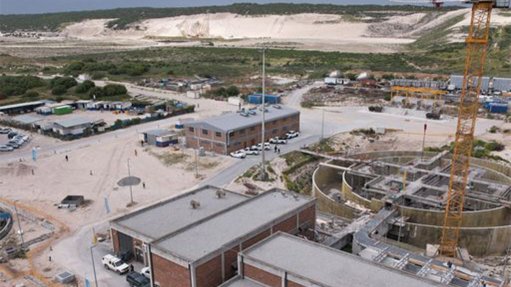
ZANDVLIET The overall Zandvliet Wastewater Treatment Works upgrade will expand existing wastewater treatment capacity by 18 Mℓ/d, bringing it to a daily total of 90 Mℓ/d
Cape Town’s Zandvliet Wastewater Treatment Works (WWTW) upgrade has reached its biggest milestone with the completion of the new membrane biological reactor.
Construction on site began in September 2018 and the estimated overall final project cost is anticipated to be in the region of R1.9-billion.
The facility treats wastewater from an expansive and growing catchment that includes the southern parts of Kuils River, Delft, Blackheath, Blackheath Industria, Blue Downs, Eerste River, De Wijnlanden, Thembokwezi, Mxolisi Phetani and Khayelitsha, all in the Western Cape.
The catchment contains residential, commercial and industrial areas. In the residential areas, the catchment caters for affordable housing, as well as subsidised housing schemes developed by the municipal and national governments, says acting Water and Sanitation MMC Siseko Mbandezi.
He says that the City of Cape Town recognised the need to expand and upgrade the Zandvliet plant to ensure that it not only meets the current wastewater treatment demands of growing communities but also produces a treated effluent that complies with the current licence conditions.
The quality of the effluent will be significantly improved and, thereby, lessen the impact on the environment, he adds.
The project will also deliver several valuable technology and equipment upgrades to the existing infrastructure.
The overall Zandvliet WWTW upgrade will expand the existing wastewater treatment capacity by 18 Mℓ/d, bringing it to a daily total of 90 Mℓ/d. The project is on track to be completed by September 2023.
In its water strategy, the city has also committed to transitioning to being a ‘water sensitive city’ by 2040 that integrates the urban water cycle, builds resilience and protects the city’s sensitive natural ecosystems, says Mbandezi.
This upgrade will result in the appointment of an additional 22 process operational staff and eight maintenance staff.
The City's investment into wastewater treatment infrastructure forms part of Mayor Geordin Hill-Lewis’s Priority Programme, which aims to deliver enhanced basic services and a healthy urban environment to improve the quality of life for the residents of Cape Town, and increase job opportunities in the surrounding areas.
This investment also forms part of the City of Cape Town’s commitment to attract business and investment.
Further, treated effluent from the Zandvliet WWTW will be supplied to the city’s planned Faure new water scheme. This scheme is an advanced water purification plant where the effluent will undergo a stringent purification process designed to ensure that water is treated to a quality that complies with South Africa’s national standard for drinking water, as well as international standards for water reuse schemes.
The highly purified drinking water will then initially be blended with water and treated again at the existing Faure water treatment plant, adds Mbandezi.
He notes that the improvements to the Zandvliet WWTW will also allow for the treated effluent to be used more extensively across the metropole for irrigation and industrial purposes – thereby saving valuable potable water resources in the future, which also forms part of the city’s water strategy.
“We know that decent sanitation is the beginning of dignity, and so much of our capital budgets over the next few years are focused on sewer pipe, pumpstation and wastewater works upgrades.”
The city has used the services of several contractors to achieve the best possible outcome for this plant, Mbandezi concludes.